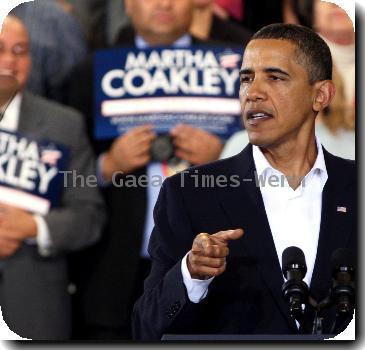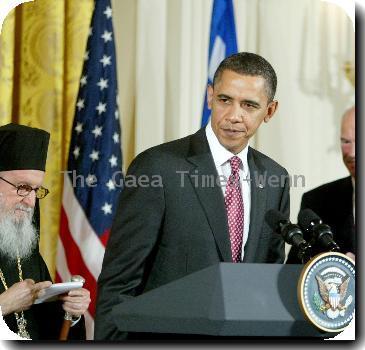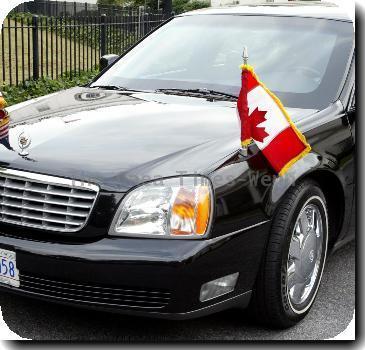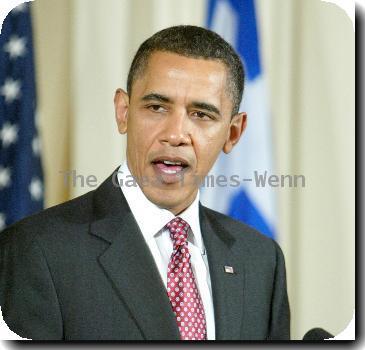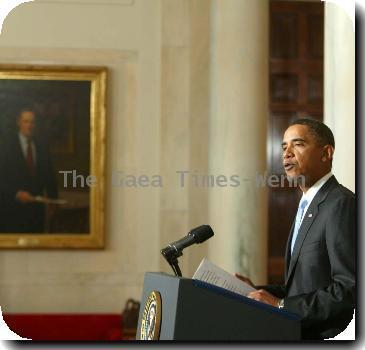Ahmadinejad urges Obama to accept nuclear swap deal or lose chance of any future cooperation
By Ali Akbar Dareini, APWednesday, May 26, 2010
Ahmadinejad urges Obama to accept nuke swap deal
KERMAN, Iran — Iran’s president on Wednesday urged Barack Obama to accept a nuclear fuel swap deal, warning the U.S. leader will miss a historic opportunity for improved cooperation from Tehran if the offer is rejected.
Mahmoud Ahmadinejad’s remarks came a day after U.S. Secretary of State Hillary Rodham Clinton said Tehran’s offer — submitted Monday to the U.N. nuclear watchdog — was inadequate and did not address international concerns about Iran’s atomic ambitions.
Washington has denounced the Iranian proposal, brokered last week by Brazil and Turkey, as an attempt by Tehran to avoid a new round of U.N. sanctions over its controversial nuclear program, which the West fears is geared toward nuclear weapons.
“There are people in the world who want to pit Mr. Obama against the Iranian nation and bring him to the point of no return, where the path to his friendship with Iran will be blocked forever,” Ahmadinejad said during a rally in the southern town of Kerman.
He also accused Russian President Dmitry Medvedev of caving in to U.S. pressure for new sanctions, warning Moscow’s support for the new draft was contrary to the two countries’ friendly relations.
“Justifying the behavior of Mr. Medvedev today has become very difficult,” he said. “The Iranian nation doesn’t know whether (Russians) ultimately are friends, whether they stand by us or are after other things. This is not acceptable.”
The unusually harsh words for Russia reflect a strain in Tehran’s relations with Moscow, a longtime trade partner of Iran with more leverage over it than Western nations. Ahmadinejad said Moscow had no excuse for giving in to U.S. pressure, and urged Medvedev to change his stance.
“I hope Russian leaders and officials pay attention to these sincere words and correct themselves, and not let the Iranian nation consider them among its enemies,” he said.
Sergei Prikhodko, a top foreign policy adviser for Medvedev, said Moscow’s position was guided by longterm state interests and was “neither pro-American, nor pro-Iranian.”
Russia rejects “all manifestations of unpredictability, political extremism, non-transparency and inconsistency in making decisions on issues of global importance,” he said. “No one has ever managed to save his authority by making use of political demagoguery.”
Iran, which insists its nuclear program is peaceful, proposed last week to ship much of its low-enriched uranium to Turkey in return for nuclear fuel rods needed for a Tehran medical research reactor. The swap would diminish Iran’s stockpile of low-enriched uranium that can possibly be used in making atomic bombs, if the uranium is enriched to a higher, weapons-grade level.
But the proposal did not deter U.S., Russia, China, Britain and France — the five permanent Security Council members — from agreeing on a draft fourth set of sanctions against Iran for refusing to completely halt uranium enrichment, as demanded by the United Nations. Clinton, speaking Tuesday in the Chinese capital, Beijing, called Iran’s proposal a “transparent ploy.”
Tehran’s offer is similar to a U.N.-drafted plan that Washington and its allies last year pressed Iran to accept, but which the Mideast nation then rejected.
“If they (U.S. and its allies) are truthful when they say they seek cooperation … they should accept this offer,” Ahmadinejad said. “But if they seek excuses, they should know that the path to any interaction will be closed.”
“Mr. Obama must know that this proposal is a historic opportunity … (Obama should) know that if this opportunity is lost, I doubt the Iranian nation will give a new chance to this gentleman in the future,” he added.
Like the U.N.-backed plan, Tehran’s proposal would commit Iran to shipping 2,640 pounds (1,200 kilograms) of low-enriched uranium for storage abroad — in this case to Turkey. In exchange, Iran would get the higher-enriched uranium fuel rods within one year.
Although it seems to be a significant concession, Tehran is believed to have more nuclear material stockpiled since the International Atomic Energy Agency first made the proposal last October. The figure is estimated at about 5,500 pounds (2,500 kilograms) of low enriched uranium.
Iran’s insistence that even with the deal it will continue to enrich uranium to 20 percent — from which it can produce weapons-grade material much more quickly than from lower levels — is an even greater problem for the West.
Iran says uranium enrichment is meant exclusively for power generation. Tehran needs the fuel rods to power the research reactor, which also produces medical isotopes to treat cancer patients.
Ahmadinejad warned the reactor is running out of fuel, and stressed that the IAEA has a responsibility to supply nuclear fuel needed by member countries.
Tags: Barack Obama, Eastern Europe, Europe, Foreign Policy, Iran, Iran-nuclear, Kerman, Lost, Middle East, Moscow, North America, Russia, Tehran, Turkey, United States, Western Europe




